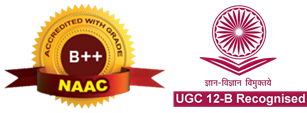All the programmes of the University are launched through a defined process wherein the PPRs (URL: http://www.uou.ac.in./ppr) for each programme are carefully prepared. These PPRs contain the specific programme objectives and outcomes. All the PPRs are uploaded on the website of the University and the web-link is provided in the data-template. Accordingly, while uploading the assignments, these programme outcomes are considered by the course coordinators/ faculties. Similarly, instructions to paper-setters also contain a copy of the concerned page of the syllabus which incorporates learning objectives and programme outcomes as well. Thus, the programme outcomes are integrated into the assessment process of the University at these two stages.
The Graduates of the University are expected to have the following specific attributes:
- Clear understanding of the courses studied with regard to the level of study as defined in the programme outcomes.
- Ability to analyze the studied areas.
- Ability to write independently.
- Ability to think about their courses of study and be able to pursue further studies.
- Ability to integrate with the social and national fabric
- Ability to have a clear understanding of the environment.
The courses of the University and the counseling is also aimed at instilling intothe learners the above mentioned attributes for each course of study of the University.
In fact, counselling in this University (during the special counseling sessions) is a sort of hand-holding and supportive monitoring to keep the learners focused on the programme outcomes.
Preparation of SILM (URL of guidelines for the development of SILM: http://uou.ac.in/sites/default/files/2020-03/SLM_manual_english_revised_2011_1.pdf), assignments, counselling, special counseling, and question papers are all linked to programme outcomes. Detailed particulars of these activities vis-à-vis the role of the guiding force of programme outcomes is as follows;
- The SILM is connected to and it is guided by the programme outcomes, say every unit begins with the specific objectives (learning outcomes) and it progress by orienting the learners towards the defined learning outcomes, though ‘self-review’, ‘check your progress’, and the questions given at the end of the unit. Thus, it (programme outcomes) is embedded in the SILM from the beginning to the end.
- Assignment given to the learners are not similar to term-end questions, rather these assignments force the learners to go through the SILM and to apply this learning perfectly in tune with the programme outcomes. Thus, the pattern of assignments keeps learners centered around the programme outcomes.
- During counseling, the counsellors also remains careful about the learning outcomes, but during special counselling-sessions organized and managed by the faculty of the University, special attention is paid to remain focused on at least some of the programme outcomes. These special counselling sessions are very useful in orienting the learners towards the programme outcomes. A particular example of M.A. (Yoga) will illustrate and authenticate this assertion. In a course, MY-103 of M.A. (Yoga), the 7th and 8th units of the second block aims that the learners should learn the activities like; Dhouti, Vasti, Nauli, Neti, Tratak, and Kapalbhati. Now, in order to ensure that the learners learn these practices, during special counselling sessions, they are made to get-up at 5:00 a.m. and the instructors help them in learning these practices during the period of next one hour. It is noteworthy that these practices are to be learnt and performed only with empty stomach. So, breakfast is given after 8:00 a.m. These practices continue for 09 days and on the tenth day the performance of learners is checked. Thus, it is only a small example of the entire process of special counseling, which is clearly directed towards the learning outcomes.
- Similarly, the paper-setters are also sent the course-contents, level of learning expected of the particular learners, and course-outcomes. Thus, the setters of question papers are also expected to remain centered around the course-outcomes, which eventually lead to programme outcomes. In case, some paper-setters deviate from this thumb-rule, suitable corrections are incorporated during moderation of external question-papers.
Accordingly, the University does have the stated programmes and course outcomes and these are integrated into the learning and assessment process.



